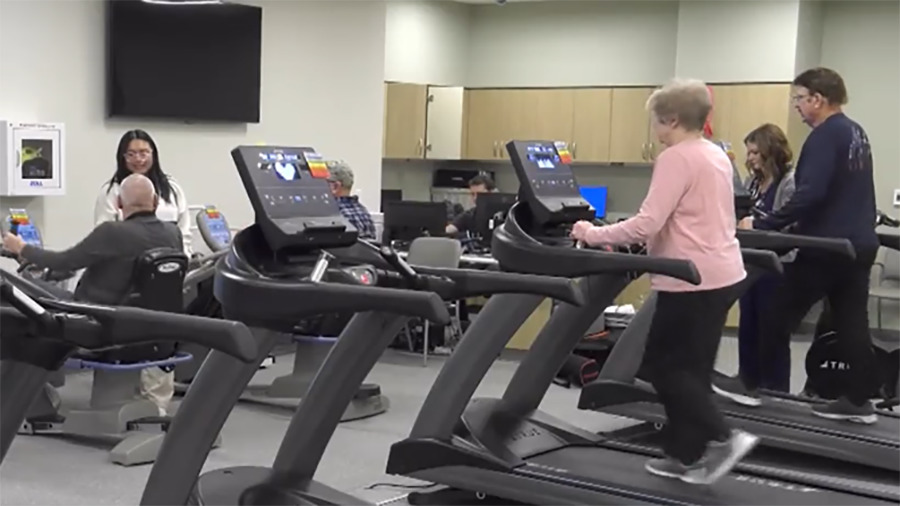How To Prevent Yourself From Falling As You Age
Sep 23, 2019, 8:20 PM | Updated: Jul 16, 2023, 3:37 pm
SALT LAKE CITY, Utah — As the weather begins to change this fall season, it’s time to think about a different kind of fall.
About 50% of adults in their eighties fall in any given year, either in their home or on slick surfaces, according to Intermountain Healthcare’s Weston Lindsay.
Eighty-six-year-old Elbert Dansie has always been on the move. He has a passion for bike riding and has competed in dozens of races and at age 78, he finished a 100-mile race.
He said he enjoys everything about the experience.
“The freedom, the being out in the open, the smells, the sounds, the temperature, the birds,” he said.
But age is inescapable, even for a retired pediatrician who has always made it a goal to stay in shape. Dansie has now become the patient after experiencing a couple of tumbles this last year.
“I ran out on the lawn and all of the sudden I slipped,” he said.
Dansie admitted he was going too fast on slippery grass in the dark and fell. He broke six ribs and spent 12 days in the hospital. Six months later, he fell again.
This time he didn’t break anything, “but the pain was just as intense,” he said. That’s when he started physical therapy in his own home.
Weston Lindsay, a physical therapist at Intermountain Healthcare, said it helps to see a patient in their environment because it helps him identify things that might be a potential fall hazard.
“Rugs tend to be one of the bigger risks of falling … electrical cords, I’ve heard of people tripping over shoes, blankets,” Lindsay said.
Lindsay also reminded people to be careful walking in low lighting or on wet surfaces.
Lindsay works on strength, balance, and endurance exercises with his patients.
“As we age, naturally, we have more struggles, he said. “There’s been some pretty good research that shows that we spend about two hours a week exercising, moderate to high challenging exercises on a balanced perspective, that we actually reduce our risk of a fall.”
Dansie said it’s helped. “I can walk better. I don’t have as much pain. I don’t feel as awkward. I feel more agile,” he said.
Five conditions that make people more at risk for falling
- Musculoskeletal weakness, pain, fatigue
- Neurological conditions (inner ear or balance problems, strokes, brain injuries, neuropathy, and multiple sclerosis).
- Cardiovascular conditions (irregular blood pressure, congestive heart failure).
- Metabolic conditions (diabetes, thyroid issues, and certain medications).
- Psychological conditions (depression, anxiety, fear of falling).
The Dansies have also made a few changes to their home. They’ve added handrails to their front steps, grab bars in the shower and removed doormats and throw rugs.
Lindsay also recommended adding non-slip mats in the shower or tub and encouraged people to not shy away from using a cane, crutch or walker. He said he sees a significant increase of falls as winter approaches.
Dansie said he avoids walking on long, wet grass and uneven surfaces. “It hurts when you fall, and so now I’m paying much more attention to where I walk,” he said.
Six simple ways to reduce your risk for falling
- Remove throw rugs, electrical cords, shoes, clothes, toys, etc. from walkable areas.
- Be aware of raised thresholds and step-down entrances.
- Use hand railings or grab bars especially near steps, stairs or in the bathroom.
- Wear tennis shoes or sneakers with non-slip soles.
- Don’t wear flip flops, sandals, slippers or shoes with an open heel.
- Keep fluids on tile or wood floors wiped up.
Dansie said he is anxious to get back in the saddle, especially with his therapist’s encouragement.
“And to me, that sounded like he’s saying, you can climb Mount Everest,” he said with a chuckle.
Between 30-to-40% of falls happen at home, and two-thirds of people who do fall will do so again within the next six months.
If you are worried about a loved one falling, you can sign up for a fall risk assessment to have a therapist evaluate their condition in your own home through your primary care physician. Afterward, contact Homecare with the referral to set-up a time for a therapist to visit.
Intermountain Healthcare also offers a fall prevention series class called “Stepping On” at Riverton Hospital and the Utah Valley Live Well Center.













